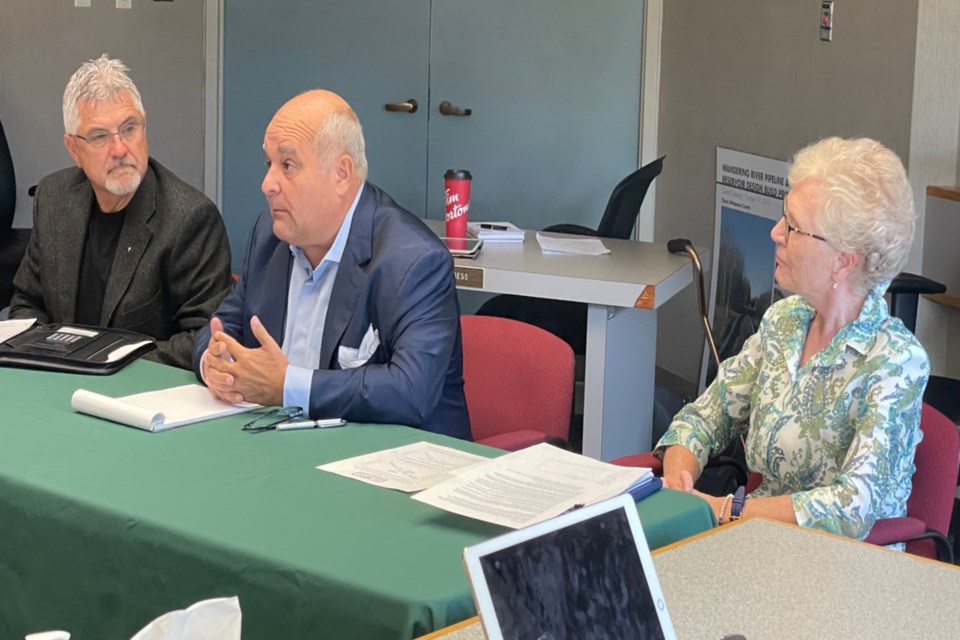ATHABASCA — Athabasca County councillors have reconsidered and will now contribute $7,500 to the lobby effort and campaign started by a group of Athabasca residents concerned about the future of Athabasca University in Athabasca.
The Keep Athabasca in Athabasca University (AU) ad hoc committee has been working away on its campaign for several months now and have hired the lobbying firm Canadian Strategy Group (CSG), after a contribution from the Town of Athabasca for $7,500 earlier this year, and private fundraising efforts.
At Athabasca County's regular council meeting Aug. 26, committee members Mavis Jacobs and Brian LeMessurier along with CSG co-founder and partner Hal Danchilla went over some of the recent activities of the group and re-addressed the request for the councillors to contribute $7,500 to the campaign, which councillors initally voted against.
“I share the same threat the rest of the members of the committee feel. I see what's happening at Athabasca University; the drain it’s having and the affect it’s having in our community,” said LeMessurier. “I believe that without the intervention, it’s about to get much worse.”
Jacobs explained two graphs the committee created with public data from Aspen View Public Schools, AU’s annual reports, the 2017 report from Ken Coates, and the Athabasca County population information found on the Government of Alberta website, along with information from the AU faculty association showing a correlation between leaving AU staff and enrolment in local schools.
“You'll see the decline in school enrolment from 2010 (was) 2029 to 1700 for (2020), and these numbers are provided by the school,” said Jacobs. “The downward trend tracks very closely and with the anticipated further decline in AU staff in the region, school enrolments are going to go down – in a 20-year period, probably a 25 per cent decline in school enrolments.”
Jacobs pointed out AU staff leaving the area has a multi-pronged impact on the region.
“We are concerned about the effect of the decline in university staff on our own county population, on school population, on everything in the region, particularly economically, but also socially and culturally,” she said. “Many things are impacted by this shift from the university and we want to work with you to come together to rally for the university to continue to have employees working on campus.”
The group recognized there will be some changes and there is no way to force AU to have all staff reside in the Athabasca region, but they do want the university to remain in its namesake community.
“There will be some changes yes, probably hybrid,” said Jacobs. “But it's very important that we retain Athabasca as the home for the university, and a place of work for the university.”
Coun. Dennis Willcott noted due to the pandemic and more people working from home, it has turned from something forced into something preferred and Coun. Travais Johnson added statistics he saw for U.S. employment predicted up to 50 per cent of the workforce will continue to work from home, up from 20 per cent pre pandemic.
“I truly believe this is the canary in the coal mine,” said Danchilla. “I really think if we are able to make a stand here, and I agree with you 100 per cent, I don't see this as being a University of Athabasca issue; I think this is about a rural way of life and I think it's about finding solutions that make some sense.”
Danchilla added time is of the essence as budgets will be formed in late October or early November and likely passed in December so there has to be continued meaningful consultation with the government.
“We've spoken to and outlined our position,” he said. “(Premier Jason Kenney) has been briefed on it and we have had a conversation with (Minister of Advanced Education Demetrios Nicolaides) at which point the minister was surprised at some of the things we had to say and I think he was surprised at how we said them.”
Danchilla added Nicolaides was unaware there was no local representation on the AU Board of Governors.
“I believe this is about unintended consequences that the government hasn't seen, because they haven't been privy to what's been going on and I think it's our responsibility to shine the light on what can we do to make sure that this remains viable,” he said. “The government has invested hundreds of millions of dollars in infrastructure and time and to simply walk away from it is wrong.”
He said the ad hoc group could continue lobbying the government on its own, but the county is an important partner in the campaign.
“And that's why you, as council here are so important to what we're trying to do,” said Danchilla. “We could do it alone, but it would be so much more efficient, so much more meaningful, and a much broader conversation if the county was involved as well.”
Willcott noted he preferred hearing the lobbying was to the provincial government and not a direct attack on AU and the rest of council agreed. Coun. Penny Stewart was already on board after the first presentation by Mavis Jacobs June 8.
“To me, if you're not fighting the university and you're going to the government, that's a different ballgame,” he said. “We’ve worked with the university a long time; always got along, but the government is a different issue.”
After the delegation left council unanimously decided, based on the new information, to contribute $7,500 to the committee to help pay for the work by Danchilla. The money will either come from the Tourism and Economic Development (TED) committee budget if there is enough, or reserves.



